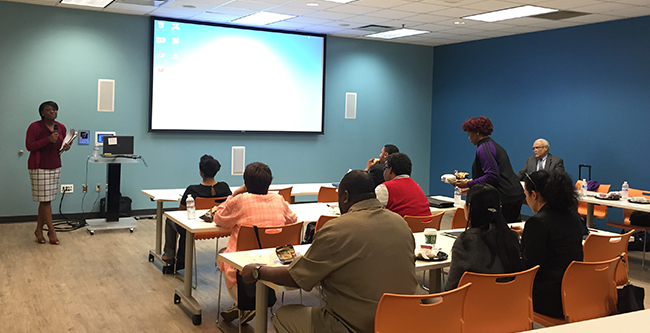
Photo by Matt Schorr
Stephania Miller-Hughes, PhD, Associate Professor in Meharry Medical College's Department of Surgery, welcomes everyone to the Bordeaux Library multi-purpose room where the Nashville Health Disparities Coalition hosted a screening of "Unnatural Causes."
NASHVILLE, Tenn. The Nashville Health Disparities Coalition recently hosted a screening of "Unnatural Causes," a documentary exploring America's racial and socioeconomic inequities in health.
The documentary asked, "How does the color of your skin affect your health? What about the size of your wallet, your stress level on the job, or the landscape of your neighborhood?" And according to researchers, these factors affect one's health a great deal.
Social and economic status, the documentary reported, directly impact a person's overall health and quality of life. An individual with higher economic standing is less prone to illness and premature death, while an individual with lower standing is at far greater risk.
Race and ethnicity, the documentary said, is also a key factor. African Americans and other minorities suffer greater health risks than whites.
These health risks are the result of increased stress levels among minorities and low income families, which puts them at greater risk of chronic stress, hypertension and other disorders.
Meharry-Vanderbilt Alliance Program Coordinator Jacquelyn Favours opened the screening by detailing 10 key aspects of health equity:
1. Health is more than health care.
- Job
- Income
- Education
- Neighborhood
2. Health is tied to the distribution of resources.
- Top - most power, lives longer and healthier
- Middle - 2x more likely to die earlier than top
- Bottom - lacks power, sicker and dies younger (4x more likely)
3. Racism imposes an added health burden.
- Discrimination
- Segregation
- Social exclusion
- Prejudice
4. The choices we make are shaped by the choices we have.
5. High demand + low control = chronic stress
- noisy/violent neighborhoods
- unreliable transportation
- lack of/poor childcare
- low wages
- uncontrolled debt
- no healthcare
- job insecurity
6. Chronic stress can be deadly.
- Increased heart rate, blood pressure and glucose can lead to a weakened immune system and increased risk of sickness and disease.
7. Inequality -- economic and political -- is bad for our health.
- tax breaks for the wealthy
- decline of unions
- racism and segregation
- outsourcing
- globalization
- cuts in social programs
8. Social policy is health policy.
- Past social reform:
- Improved wages
- Better work conditions
- Universal schooling
- Civil rights laws - Potential social reform:
- Living wage
- Paid sick and family leave
- Guaranteed vacation time
- Universal preschool
- Access to college
9. Health inequalities are not natural.
- In the United States, there are higher racial and class inequities, while other advanced nations have measure to ensure less inequality and higher access to health resources despite income.
- In 2012, 1 in 5 children --16.1 million -- were living in poverty.
10. We all pay the price for poor health.
- $2 trillion per year -- 2x more than the average of other developed countries.
*Information provided by Unnatural Causes website
Afterward, Paxton Montgomery from the Metro Health Department discussed local health and health indicator statistics, while Linda McClellan and Dr. Margaret Hargreaves of Nashville REACH 2020 and Dr. Robert Wingfield of the Environmental Health Initiative focused on local efforts to combat health disparities.
To learn more about "Unnatural Causes" and health disparities, please visit www.UnnaturalCauses.org.
About the Meharry-Vanderbilt Alliance
Founded in 1999, the Meharry-Vanderbilt Alliance bridges institutions of Meharry Medical College and Vanderbilt University. Its mission is to enrich learning and advance clinical research by developing and supporting mutually beneficial partnerships between Meharry Medical College, Vanderbilt University and the communities they serve.



